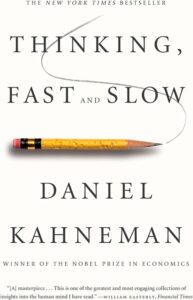When it comes to giving and receiving good advice, your brain may be getting in the way.
Daniel Kahneman, author of the blockbuster book, Thinking, Fast & Slow, is famous for his work on the psychology of decision-making. He was awarded the Nobel Prize in Economic Sciences. An enormous body of research from Kahneman and his colleagues over decades suggests the following:
- You’re not as rational as you think.
- Emotions, automatic responses, and mental shortcuts are much bigger drivers of our decisions than you might think.
- Facts matter much less than you might think when you’re making decisions.

Kahneman and his long-time colleague, Amos Tversky, report that humans are prone to “severe and systematic errors” in their thinking because of the way their brains work. Much of that flows from cognitive biases, which are systematic errors in thinking that influence (and degrade) your decisions. Unfortunately, these cognitive biases can degrade or even ruin both the giving and receiving of advice. We address each of those in turn below.
How Cognitive Biases Can Affect GIVING Advice
Here are several examples of how cognitive biases can degrade the thinking of advice givers and thus the quality and helpfulness of their advice:
Overconfidence Bias (when your confidence in your own knowledge or abilities exceeds the actual accuracy or skill you possess). You’re likely overestimating the probability your advice will work while also downplaying the potential difficulties. For example, if you’ve had some successful investments in the stock market, you might become overconfident in your ability to pick stocks or predict market trends. You might suggest risky investments without fully accounting for the risks and complexities involved. Big pain may follow for your friend.
Anchoring (when you rely too heavily on the first piece of information you encounter—the “anchor”—when making decisions, even if that information is irrelevant or incorrect). People tend to weight information more heavily when it appears early in a series, even when order isn’t important. For example, you might advise a colleague to accept a job offer based on the salary figure mentioned, which is higher than their current salary. Your colleague may end up overlooking other important factors like benefits, job security, flextime, and career growth opportunities.
Illusion of Control (overestimating your ability to control events). When giving advice, you’re likely forgetting many of the things that helped you address a similar situation. You may focus on your approach while downplaying the role of other key factors, such as other helpers and mentors, outside events, or even blind luck. Maybe you have navigated a few personal conflicts in your own marriage or with your team, and you start to believe you have a special knack for resolving relationship issues. You might give advice to friends experiencing relationship troubles, recommending specific approaches that worked for you. However, overestimating your ability to control and influence relationship dynamics can lead to poor advice, as each relationship is unique and influenced by complex factors that may not be addressed by the advice.
Framing (reacting to a choice differently depending on how it’s presented, whether as a loss or as a gain). For example, perhaps a business mentor advises a colleague to accept a job offer because it includes a significant annual bonus. Meanwhile, that framing is focused solely on the bonus without considering that it’s conditional on meeting challenging or even unrealistic performance targets—or that the base salary is lower than industry standards. Because of the framing, the mentee might overlook other less favorable aspects of the offer, resulting in a decision that doesn’t fully align with their current context and career goals.
Selective Recall (when you more accurately remember information or messages that are closer to your interests, values, and beliefs than those that contrast with them). You might recall more recent instances when taking an aggressive approach with your boss resulted in a big pay increase, forgetting about less successful times. Or you might be reminiscing about how a broad job search strategy worked well for you. As an investor, you might better recall the times when your stock picks were successful, conveniently forgetting the duds.
Curse of Knowledge (when you assume others also know what you know about a subject). If you have expertise in a field, you may struggle to simplify complex information for others who lack that specialized knowledge. It’s likely that you’ve known some things for so long that you forgot what it was like not to know them and thus have a hard time remembering that not everyone else knows them as well. For example, you might advise a junior employee to quit a job because you’re confident they can quickly find a better position. Perhaps you’ve been through multiple resignations and firings. Meanwhile, you’re taking for granted your own extensive network and industry knowledge. You may be overlooking the junior employee’s less extensive network and their limited experience and job market understanding. Not to mention how overwhelmed or even terrified they may be feeling about the changes.
“Skillful performance and skillful teaching are not always the same thing,
so we shouldn’t expect the best performers to necessarily be the best teachers as well.”
-David Levari
“Hammers and Nails” (if you’re good with a tool, you may want to use it more often than is warranted). Example: If you’ve analyzed a problem in depth, you can end up exaggerating the importance of that problem. Recall that no one tool is good for everything. If your favorite tool is a hammer, look for colleagues with screwdrivers and wrenches. As a CEO, maybe you’ve used drastic cost-cutting in the past and now over-rely on that as a strategy. Or as a manager, maybe conflict-resolution training has worked well for you in the past but isn’t appropriate in the current context. As a founder, maybe you believe your inspirational speeches in front of the whole company are more impactful than they really are. (Source for the “hammer and nails” term and concept: Hans Rosling, Factfulness: Ten Reasons We’re Wrong About The World–And Why Things Are Better Than You Think.)

“We are skeptical that advisers can rid themselves of the cognitive and motivational biases that skew advice.” -Jason Dana and Daylian Cain, “Advice Versus Choice”, Current Opinion in Psychology, Volume 6, December 2015
How Cognitive Biases Can Affect RECEIVING Advice
Unfortunately, cognitive biases can also downgrade or corrupt the thinking of the person receiving advice, compounding the problem even further. Here are examples:
Confirmation bias (your tendency to favor information that confirms your pre-existing beliefs and to ignore information that contradicts them). The person receiving your advice is likely not getting the message you’re trying to send. Instead, they’re subconsciously hyping the things you’re saying that fit with their existing beliefs while downplaying or even ignoring the ones that go against their beliefs. Common career beliefs that might bias their thinking include:
- changing careers is a sign of instability or failure
- a successful career must follow a straightforward, linear progression
- advanced degrees or prestigious educational institutions automatically lead to better job opportunities and faster career progression
“Confirmation bias is probably the single biggest problem in business, because even the most sophisticated people get it wrong. People go out and they’re collecting the data, and they don’t realize they’re cooking the books.” -Dan Lovallo, decision-making researcher and professor
Halo Effect (when your overall positive impression of someone influences your judgments about their specific traits or advice). For example, you might get advice from a respected professor with an engaging teaching style but who has expertise in a different field. Because you admire the professor, you might follow her advice on career choices or thesis research methods that are outside her area of expertise. Meanwhile, you might be downplaying your own goals or not letting your core values guide you.
Positive Illusion (when you have unrealistically favorable attitudes about yourself or your future.) Did you know that the vast majority of us consider ourselves above average when it comes to leading, driving, getting along with others, and, yes, giving out helpful advice? Example: as an entrepreneur, you might believe that your new startup is destined for success despite numerous warning signs and market challenges. Your overconfidence can lead you to ignore critical feedback or warnings, ultimately jeopardizing your venture’s success.
Mere Exposure Effect (the tendency to develop a preference for things simply because they’re familiar). As a hiring manager, maybe you’ve repeatedly heard the name of a candidate from colleagues or advisors. This repeated exposure can lead you to favor (perhaps subconsciously) this candidate over others, even if other applicants are more qualified.
How Cognitive Biases Can Affect BOTH GIVING & RECEIVING Advice
Sometimes, the problem with cognitive biases and advice works in both directions—degrading the thinking of both the advice giver and receiver. A few examples:
Planning Fallacy (the tendency to underestimate the time, costs, and risks of future actions and to overestimate their benefits). For example, you might advise someone to set an ambitious deadline for a new project, underestimating the time required for research, development, and testing. Meanwhile, they’re overestimating the benefits of the work while downplaying the challenges. Ouch.
WYSIATI (“What You See Is All There Is”—the tendency to ignore the possibility that there’s missing information in a scenario). Here you might not consider that your current knowledge might be incomplete and that missing information could significantly impact your decisions. For example, if you traveled somewhere years ago, you might recommend that place based on your positive experience there, overlooking potential issues like crime, safety, seasonal weather differences, or new political problems. The person hearing about it may assume they don’t need to do their own checking based on your effusive recommendation.
Conclusion
Clearly, advice comes with many challenges due to the way our minds work. You’re wise to be mindful of those challenges when giving and receiving advice—noting that many of these factors can be at work in a single advice session. Why not consider other ways of giving and receiving help that don’t have these pitfalls?
(This article is third in a three-part series on advice. Check out the other articles: “The Hazards of Advice” and “Don’t Give Advice. Do This Instead.”)
Tools for You
- Traps Test (Common Traps of Living) to help you identify what’s getting in the way of your happiness and quality of life
- Quality of Life Assessment to help you discover your strongest areas and the areas that need work and then act accordingly
- Strengths Search to help you identify your core strengths and determine how to use them more in your life and work
Related Articles
- “The Hazards of Advice”
- “Don’t Give Advice. Do This Instead”
- “How to Give Effective Feedback—A Communication Superpower”
Appendix: Quantity vs. Quality of Advice
Another problem comes with the quantity of advice given. Assistant Professor David Levari of Brown University and his colleagues found, across several studies, that top performers give more advance than others, but don’t give better advice.
“In our experiments, people given advice by top performers thought that it helped them more, even though it usually didn’t…. Top performers didn’t write more helpful advice, but they did write more of it, and people in our experiments mistook quantity for quality.”
-David Levari
In a 2022 Psychological Science article, the researchers concluded the following: “People seem to mistake quantity for quality. Our studies suggest that in at least in some instances, people may overvalue advice from top performers.” (Source: David E. Levari, Daniel T. Gilbert, Timothy D. Wilson. Tips From the Top: Do the Best Performers Really Give the Best Advice? Psychological Science, 2022; 33 (5).)
+++++++++++++++++
Gregg Vanourek is a writer, teacher, and TEDx speaker on personal development and leadership. He is co-author of three books, including LIFE Entrepreneurs: Ordinary People Creating Extraordinary Lives (a manifesto for living with purpose and passion) and Triple Crown Leadership: Building Excellent, Ethical, and Enduring Organizations (a winner of the International Book Awards). Check out his Best Articles or get his monthly newsletter. If you found value in this article, please forward it to a friend. Every little bit helps!








